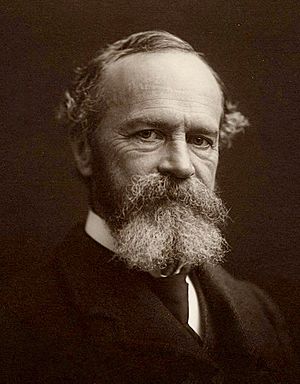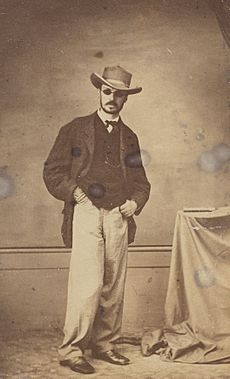William James facts for kids
Quick facts for kids
William James
|
|
|---|---|

James in 1903
|
|
| Born | January 11, 1842 New York City, US
|
| Died | August 26, 1910 (aged 68) |
| Alma mater | Harvard University (MD) |
| Era | 19th-/20th-century philosophy |
| Region | Western philosophy |
| School |
|
| Institutions | Harvard University |
| Notable students |
|
|
Main interests
|
|
|
Notable ideas
|
|
|
Influenced
|
|
William James (born January 11, 1842 – died August 26, 1910) was an important American philosopher and psychologist. He was the first person to teach a psychology course in the United States.
Many people consider James to be one of the most important thinkers of the late 1800s. He is also called the "Father of American Psychology." Along with Charles Sanders Peirce, James helped create a way of thinking called pragmatism. He also helped start a field of psychology called functional psychology. In 2002, a study ranked James as the 14th most famous psychologist of the 20th century.
Contents
Early Life and Education
William James was born in New York City on January 11, 1842. His father, Henry James Sr., was a well-known writer and thinker. The James family was very smart and wrote many letters, which historians still study today.
William had a unique education. He traveled a lot between America and Europe, learning to speak German and French fluently. His family wanted him to be open to different cultures. He visited Europe 15 times in his life.
At first, William wanted to be a painter. He even trained with an artist. But his father wanted him to become a doctor. William wasn't interested in medicine. He decided to study the nervous system and psychology instead. In 1861, he started studying science at Harvard College.
During his younger years, James had many health problems. He also struggled with periods of sadness and worry. He believed in peace and suggested that young people should serve their communities instead of joining the military. He thought this would help them grow up.
In 1864, he began studying at Harvard Medical School. He took a break in 1865 to join a science trip up the Amazon River. But he had to leave after eight months because he got very sick. His studies were interrupted again in 1867 due to illness. He went to Germany to find a cure and stayed there for over a year. During this time, he started writing and publishing his ideas.
James finally earned his medical degree in 1869, but he never worked as a doctor. He found his true interests were in philosophy and psychology. He once said that he became a psychologist and philosopher by chance. He married Alice Gibbens in 1878.
William James's Career at Harvard
William James met and talked with many famous writers and thinkers. These included his godfather Ralph Waldo Emerson, Charles Sanders Peirce, Bertrand Russell, and Sigmund Freud.
James spent almost his entire career at Harvard University. He started as an instructor in physiology in 1873. He became a professor of psychology in 1876 and later a professor of philosophy. He retired in 1907.
James was interested in how the human mind works. He helped make psychology a scientific field. He learned from scientists like Hermann von Helmholtz and Pierre Janet. In 1875, he taught the first experimental psychology course at Harvard.
While at Harvard, James was part of a group called The Metaphysical Club. This group included important thinkers like Charles Sanders Peirce and Oliver Wendell Holmes, Jr.. They discussed many philosophical ideas. James also joined the American Anti-Imperialist League in 1898. This group was against the United States taking over the Philippines.
Many famous people were James's students at Harvard. These included Theodore Roosevelt, W. E. B. Du Bois, and Gertrude Stein. His students remembered him as a brilliant teacher who was kind and humble.
After retiring in 1907, James continued to write and give lectures. He published important books like Pragmatism and A Pluralistic Universe. He had heart problems in his later years. He passed away on August 26, 1910, at his home in New Hampshire. He was buried in Cambridge, Massachusetts.
James was a strong supporter of functionalism in psychology. This idea looks at how the mind helps us adapt to our environment. He also supported pragmatism in philosophy. He helped start the American Society for Psychical Research. This group studied unusual mental abilities.
William James's Family
William James was the son of Henry James Sr. and Mary Robertson Walsh. He had four brothers and sisters: Henry (a famous writer), Garth Wilkinson, Robertson, and Alice.
William married Alice Howe Gibbens in 1878. They had five children: Henry, William, Herman (who died as a baby), Margaret, and Alexander.
Most of William James's family came to America from Scotland or Ireland in the 1700s. They were farmers, merchants, and traders. They were also very involved in their churches. William James's grandfather, also named William James, came to America from Ireland in 1789. He started with no money but worked hard. He became a store clerk and eventually owned his own store. He helped make Albany, New York, a big trading center. He became one of the richest men in New York. After he died, his son Henry James (William's father) inherited his money.
Important Writings
William James wrote many books and articles. One list of his writings is 47 pages long!
Some of his most important books are:
- The Principles of Psychology: This was a groundbreaking book in the field of psychology.
- Essays in Radical Empiricism: An important book about philosophy.
- The Varieties of Religious Experience: This book explored different kinds of religious experiences.
James is remembered as one of America's most important thinkers. He influenced many people with his ideas about psychology, philosophy, and religion.
What is Pragmatism?
William James was a pragmatist. This means he believed that the "truth" of an idea depends on how useful it is. If an idea works well in real life and helps people, then it can be considered true. He thought that truths are not fixed forever. They can change as we learn more and as our experiences change.
James believed that the world is full of many different experiences. He called his idea "radical empiricism." This means that we can only understand the world through our experiences. He thought that when we try to study something, our own minds and the act of observing it will always affect what we find. Our minds, experiences, and nature are all connected.
James also talked about the "stream of consciousness." This idea describes how our thoughts and feelings flow continuously, like a river. This idea greatly influenced writers and artists in the early 1900s.
Free Will: Do We Choose Our Actions?
William James thought a lot about free will. This is the idea that we can choose our own actions. He developed a two-part model to explain how we make decisions.
James believed that "chance" plays a role in our decisions. Chance means that some things are possible, but not guaranteed. He said that our ability to choose comes from the fact that we can change how much effort we put into something. If the effort we put in was already decided, then our actions would also be decided.
He also said that free will involves balancing our "ideals" (what we think is best) and our "propensities" (what is easiest to do). To act on our ideals, we need effort to resist what's easy. James believed that free will is about how much effort we put into paying attention or agreeing to something.
In his model, "chance" comes before "choice." We are given a chance to make a decision, and then our "choice" is what we do about it. James also thought that our past experiences help us make choices. When we make a decision, that experience is stored in our memory. We can then use it to help us make future decisions.
James's Theory of the Self
William James had a theory about how we see ourselves. He divided the "self" into two parts: the "Me" and the "I."
- The "Me" is like the part of you that you can describe. It's what you refer to when you say, "It was me who ate the cookie."
- The "I" is the part of you that knows who you are and what you've done. It's the "I" in "I know it was me who ate the cookie."
James called the "Me" part the "empirical me" and the "I" part the "pure Ego." For James, the "I" was the thinking part of the self. He connected it to a person's soul or mind. This idea has inspired many teachers and educators.
James further divided the "Me" into three parts:
Material Self
The material self includes things that belong to a person or groups they belong to. This means your body, your family, your clothes, and your money are all part of your material self. James believed your body was the most important part. He also thought clothes were important because they show who you are or your status. Losing a family member or a lot of money could change who you feel you are.
Social Self
Our social selves are how we act in different social situations. James believed we have many social selves. For example, you might act differently at school than you do with your friends. Even within one social group, like at school, you might act differently when talking to a teacher compared to talking to a classmate.
Spiritual Self
For James, the spiritual self is who we are deep down. It's more lasting than the other two selves. It includes your personality, your core values, and your conscience. These things usually don't change much during your life. The spiritual self involves looking inside yourself to think about deeper questions. James believed that understanding your spiritual self was more rewarding than just satisfying your social or material needs.
Pure Ego
This is what James called the "I" self. The pure ego helps us feel like we are the same person over time – in the past, present, and future. This feeling of being a continuous person comes from our continuous "stream of consciousness." James thought the pure ego was like the soul or mind. He believed it couldn't be studied by science because it wasn't a physical thing.
Notable Works
- The Principles of Psychology, 2 vols. (1890)
- Psychology (Briefer Course) (1892)
- The Will to Believe, and Other Essays in Popular Philosophy (1897)
- Talks to Teachers on Psychology: and to Students on Some of Life's Ideals (1899)
- The Varieties of Religious Experience: A Study in Human Nature (1902)
- Pragmatism: A New Name for Some Old Ways of Thinking (1907)
- A Pluralistic Universe (1909)
- The Meaning of Truth: A Sequel to "Pragmatism" (1909)
- Some Problems of Philosophy: A Beginning of an Introduction to Philosophy (1911)
- Essays in Radical Empiricism (1912)
See also
 In Spanish: William James para niños
In Spanish: William James para niños
Images for kids
-
William James and Josiah Royce, near James's country home in Chocorua, New Hampshire in September 1903.





